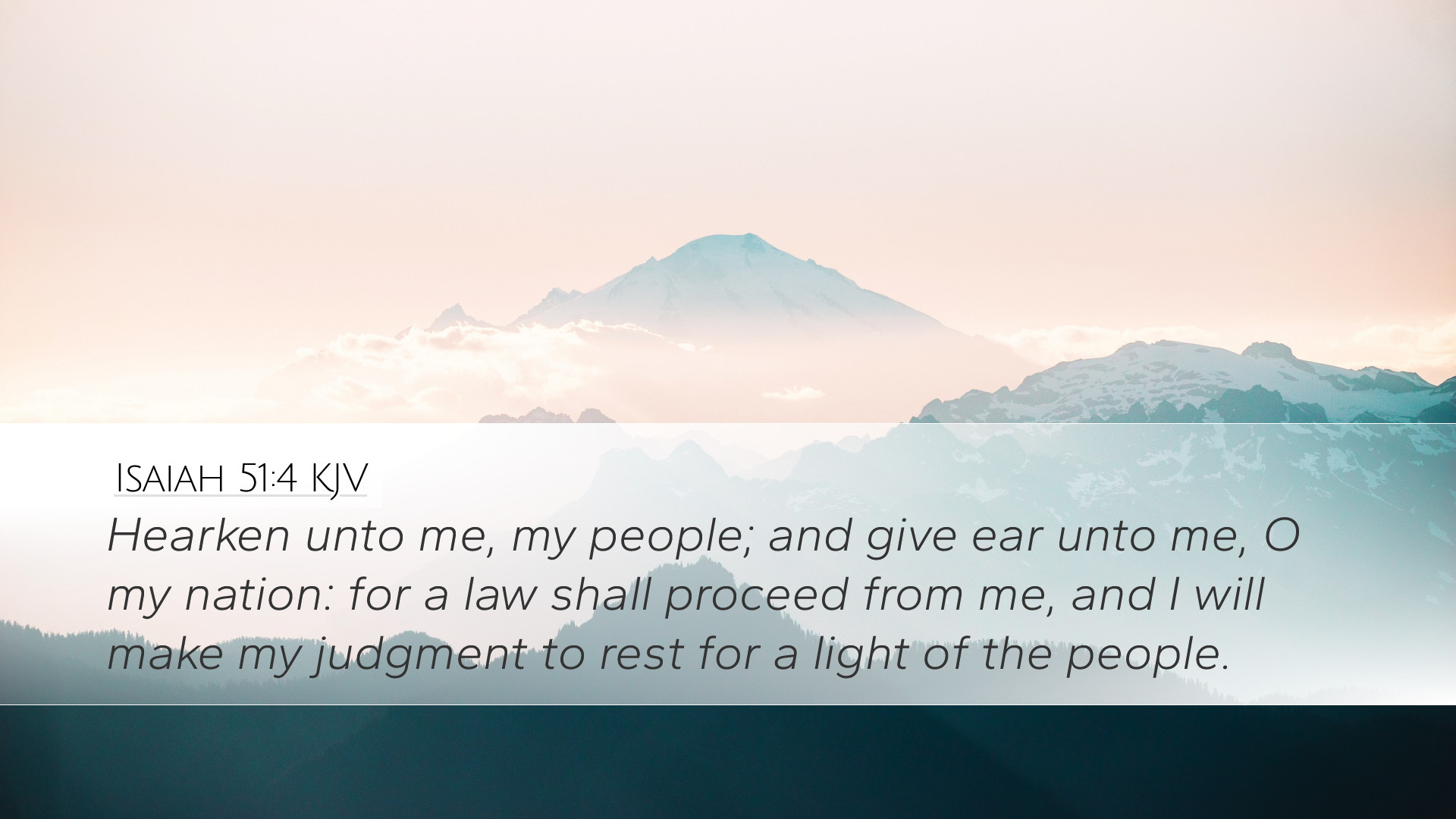Commentary on Isaiah 51:4
Verse: Isaiah 51:4 (KJV) - "Hearken unto me, my people; and give ear unto me, O my nation: for a law shall proceed from me, and I will make my judgment to rest for a light of the people."
Introduction
The verse from Isaiah 51:4 serves as a profound call for attention from God to His people. This exhortation encapsulates the divine desire for His followers to listen and receive guidance. It marks a pivotal moment within the text of Isaiah, wherein God's intentions and declarations about justice and law are communicated. This commentary draws from the insights of notable public domain commentators such as Matthew Henry, Albert Barnes, and Adam Clarke, emphasizing the significance of the verse for pastors, students, theologians, and Bible scholars.
Observations from Commentators
-
Matthew Henry's Insights
Matthew Henry explains that this verse opens with a command for active listening: "Hearken unto me." Here, God desires that His people not only hear His words but also engage actively with them. This reflects the importance of attentive obedience in the relationship between God and His followers.
Henry also notes that the term "law" signifies a divine order that is beneficial and enlightening. It suggests that the teachings and instructions God provides are meant to guide His people towards righteous living. The metaphor of God’s judgment serving as "a light of the people" encapsulates the illuminating power of God's provisions for moral clarity and social order.
-
Albert Barnes' Perspective
Albert Barnes points out the communal aspect of God’s message: "my people" and "my nation." This emphasizes the chosen identity of Israel as a collective. He stresses that God speaks directly to them, urging them to focus on the forthcoming law and judgment that are to emanate from Him.
Moreover, Barnes elucidates that the phrase "for a law shall proceed from me" indicates the origin of true law and justice. This is not merely legalism, but an ethical system that reflects God’s character and His righteousness. It serves as a foundational element for establishing justice among His people, thus fostering a society that reflects divine principles.
-
Adam Clarke's Further Analysis
Adam Clarke emphasizes the implications of divine instruction being likened to light. In his commentary, he notes how light dispels darkness; thus, when God’s judgments and laws are heeded, they lead to a transformation from spiritual darkness to enlightenment. This is particularly relevant in the context of a nation’s moral and spiritual state.
Clarke also highlights the enduring relevance of God's law for future generations. He situates the passage within the broader narrative of redemption, illustrating how God’s desires were not limited to ancient Israel but extend to all nations through Christ. His interpretation stresses that obedience to God’s directives results in blessings not only for individuals but also for nations as a whole.
Theological Implications
This verse also brings forth significant theological implications that resonate throughout scripture. The call to "hearken" signifies a relationship that God longs to cultivate with His people based on trust and adherence to His statutes. The idea that judgment will proceed as a light signifies a God who is both just and merciful, seeking to guide humanity toward fairness and righteousness.
The use of the terms “my people” and “my nation” invites theological reflection on the nature of community within the faith. It serves as a reminder that God’s covenantal relationship is collective, fostering unity, responsibility, and accountability among believers. This communal aspect is crucial for biblical interpretation as it challenges individualistic perspectives often prevalent in modern contexts.
Practical Applications
For contemporary pastors and church leaders, Isaiah 51:4 offers critical insights into the responsibilities of guiding congregations. It emphasizes the importance of preaching and teaching that not only emphasizes personal salvation but addresses the wider societal implications of God's law. Congregations must be encouraged to listen attentively to God’s teachings and apply them in their lives.
Additionally, this verse serves as a call to social justice within the community, urging believers to reflect God's character in their actions and decisions. It becomes vital for students of the Bible and theologians to explore how scriptural teachings can influence public ethics and governance.
Conclusion
Isaiah 51:4 is a rich verse that encapsulates God's desire for His people to listen and to respond to His guidance. By drawing from the insights of Matthew Henry, Albert Barnes, and Adam Clarke, we can see the depth of meaning within this scripture. The call to heed God’s law remains a timeless challenge for believers, demanding active engagement and reflection in their spiritual journey. As we ponder these interpretations, may we seek to embody the justice and light that God's judgments bring into a world that desperately needs it.


